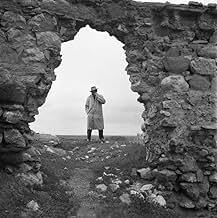In 1964 the American writer William Saroyan went on a pilgrimage to Eastern Turkey to rediscover the land where his family had grown up. When they had been forced to emigrate in the early twentieth century, there was a large Armenian community around the Bitlis area; but matters all changed as a result of the 1915 upheaval. Saroyan himself was born in California; but he had been brought up as an Armenian speaker, even if he could not read the language. Lusin Dink's film retraces Saroyan's (Norikyan Artur's) through a series of point-of-view shots; we never see his face, but rather see what he sees as he travels through his "homeland" which he has hitherto never visited. On the soundtrack we hear Saroyan's actual words, spoken by Ara Mgrdichian. SAROYANLAND makes us aware of the historicity of the trip by having Saroyan travel in a mid-Sixties automobile; this is contrasted with the landscapes and cities he visits, which are all resolutely contemporary. Through this contrast director Dink makes us aware of how little and how much has changed; the buildings might remain the same as they were in the early part of the twentieth century, but now there are no Armenian people inhabiting those areas. Hence the film recounts a narrative of loss, both physical as well as emotional: despite his success as a writer, Saroyan understands that he can never really recover his roots, despite being able to revisit the sites of his birth. SAROYANLAND also operates as an allegory for all Armenians living in Turkey, both past and present; like Saroyan, they have had to cope with the trauma of displacement and marginalization. The director herself is the daughter of journalist Hrant Dink, a prominent figure who was murdered several years ago. Even though there remains a community in İstanbul, they still do not feel part of mainstream Turkish society; they remain on the periphery, just like Saroyan himself. The narrative is slow-moving, giving viewers plenty of time to focus on the landscape, as well as the reactions of the people to Saroyan's presence. Nonetheless SAROYANLAND is a poignant yet powerful film, whose subject-matter remains as significant today as it did half a century ago.









